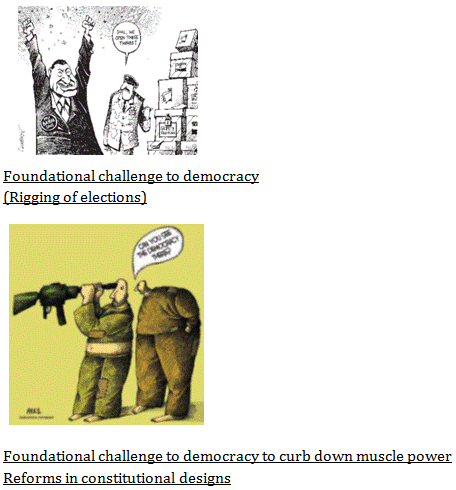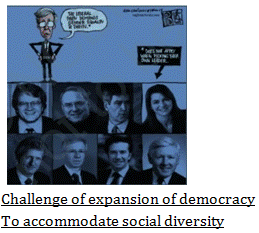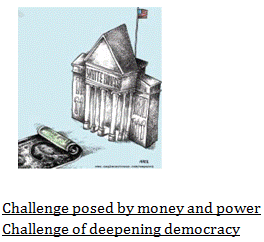Class 10 NCERT Solutions Civics Chapter 8 - Challenges To Democracy
Practise with TopperLearning’s NCERT Solutions for CBSE Class 10 Civics Chapter 8 Challenges to Democracy for exam preparation. Through our Civics chapter solutions, revise topics like rigging of elections and reforms in constitutional designs. Dive deeper into the challenges faced by a democracy by studying different case scenarios across countries.
In this CBSE Class 10 Civics chapter, learn about democratic rights, elections, decentralisation and other concepts. Along with our textbook solutions, use our videos, sample paper solutions and online mock tests to prepare these Civics topics for your exam.
Challenges To Democracy Exercise 103
Solution 1



Challenges To Democracy Exercise 104
Solution 2
|
Case and Context
|
Your description of the challenges for democracy in that situation |
|
Chile: General Pinochet's government was defeated, but military was still in control of many institutions. |
(Example) Establishing civilian control over all governmental institutions, holding the first multi-party elections, recalling all political leaders from exile. |
|
Poland: After the first success of solidarity, the government imposed martial law and banned solidarity. |
Establishing political freedom of the people of the country, restoration of democracy and holding of free and fair elections. |
|
Ghana: Just attained independence, Nkrumah elected the President.
|
To strengthen the roots of democracy and to curb the growing political power of the military. |
|
Mynamar: Suu Kyi under house arrest for more than 15 years, army rulers getting global acceptance.
|
To weaken the political power of military and restore democracy. To give the freedom of speech and expression to people. |
|
International Organisations: US as the only superpower disregards the UN and takes unilateral action. |
To give equal voting rights to all member nations of the world. |
|
Mexico: Second free election after the defeat of PRI in 2000; defeated candidates alleges rigging. |
To hold free and fair elections without any malpractices and influence of the reigning government. |
|
China: The Communist party adopts economic reforms but maintains a monopoly over political power. |
To hold multiparty free and fair elections. |
|
Pakistan: General Musharraf holds referendum, allegations of fraud in the voter's list. |
To eliminate fraud malpractices during referendum and elections. |
|
Iraq: Widespread sectarian violence as the new government fails to establish its authority. |
To prevent the killings based on sects. |
|
South Africa: Mandela retires from active politics; pressure on his successor Mbeki to withdraw some concessions given to the white minority. |
To prevent the domination of majority community over the minority community. |
|
US, Guantanamo Bay: UN Secretary General calls this a violation of international law; US refused to respond. |
To prevent the domination of the world body like UNO from domination of influential, rich and powerful countries like USA |
|
Saudi Arabia: Women were not allowed to take part in public activities, no freedom of religion for the minority. |
To establish the principle of universal adult franchise and the freedom to practice ones own religion. |
|
Yugoslavia: Ethnic tension between Serbs and Albanians on the rise in the province of Kosovo; Yugoslavia disintegrated. |
To minimize social differences and social divisions in disintegrated Yugoslavia and to establish the principle of power sharing. |
|
Belgium: One round of constitutional change taken place, but the Dutch speakers not satisfied; they want more autonomy. |
To give equal political rights to both the Dutch and French speaking communities. To prevent the partition of the country on linguistic basis. |
|
Sri Lanka: Peace talks between the government and LTTE breaks down, renewed violence. |
To prevent a civil war, the brutal state supported violence on the sectarian minority community. |
|
US, Civil Rights: Blacks have won equal rights, but they are still poor, less educated and marginalised. |
To establish economic equality and provide equal opportunities of education and health facilities to all including blacks. |
|
Northern Ireland: The civil war has ended but Catholics and Protestants yet to develop trust. |
To provide equal political, religious and economic freedom to both the communities. |
|
Nepal: Constituent Assembly about to be elected; unrest in Tarai areas; Maoists have not surrendered arms. |
To establish and strengthen democracy and to prevent violence that can threaten the forces of democracy. |
|
Bolivia: Morales, a supporter of water struggle, becomes the Prime Minister, MNC's threaten to leave the country. |
To establish democratic principles, which are beneficial to each and every section of society. |
Challenges To Democracy Exercise 106
Solution 3
|
Constitutional design
|
It is related to framing of the Constitution and giving rights and freedom to people. It applies for countries like Saudi Arabia, China, Belgium, Nepal and Poland. |
|
Democratic rights
|
To provide people with basic rights and freedoms in countries like Saudi Arabia, Guantanamo Bay and Poland. In India, even now in villages, people of lower caste are discriminated. |
|
Working of institutions
|
Challenge to non-democratic countries like Mexico, Myanmar and China. In India, some parties and organisations work on caste and communal lines. |
|
Elections
|
To hold free and fair elections in countries like Mexico, Chile and Poland. In India, rigging of elections is a big challenge to democracy. |
|
Federalism, decentralization
|
To establish democratic institutions at local levels also in Yugoslavia and Belgium. In India, the challenge is to establish linguistic equality. |
|
Accommodation of diversity
|
To resolve social diversified issues in countries like Northern Ireland, Yugoslavia, Belgium and Sri Lanka. In India, caste and communal clashes pose a challenge to democracy. |
|
Political Organisation
|
To democratise organisations in countries like Ghana, Northern Ireland, Sri Lanka and South Africa. In India, there is increased criminalisation of political parties. |
|
Religious and equality
|
To establish religious equality in countries like Saudi Arabia and Northern Ireland. In India, religious, social and economic discrimination of people belonging to lower castes exists. |
Challenges To Democracy Exercise 107
Solution 4
|
Foundational Challenge |
Poland, Iraq and Nepal. In India, carving the states of Telangana out of Andhra Pradesh and decide the status of Hyderabad.
|
|
Challenge of Expansion
|
Ghana, Yugoslavia, Sri Lanka and Northern Ireland. In India, to grant more powers to local self-institutions like municipal bodies and village panchayats.
|
|
Challenge of deepening
|
Mexico, Saudi Arabia, Belgium and US- Civil rights. In India, to increase women representation in Parliament and state legislatures.
|
Solution 5
|
Priority |
Challenges to democracy |
Example |
Reasons for Preference
|
|
1.
|
Criminalisation of Politics |
To prevent people with criminal charges to participate in elections. |
To have only people with a clean image to govern and frame laws for the country. |
|
2.
|
Challenge of Deepening
|
To provide religious, social and economic equalities to the people of lower castes. |
To eliminate any kind of social, political and religious discriminations. |
|
3.
|
Corruption
|
To lure the poor voters to vote for their parties by offering money and food grains like wheat and rice at low costs. |
To allow free and fair elections and to give fair chance to independent candidates. |
|
4.
|
Challenge of expansion
|
To give proposed 33% reservation for women in parliament. |
To give better representation to women who constitute half of the population of the country. |
|
5.
|
Challenge of Deepening |
To accommodate various social diversified issues |
To avoid the domination of majority over minority. |
Challenges To Democracy Exercise 109
Solution 6
Challenge
There is an increased criminalisation of politics. Many people who have been charged with criminal cases have nominated their papers for the central and the state elections. There is general concern among the common people about the outcome of the elections. Often such contestants get themselves elected either by rigging the votes or by distributing money to the people. If people with criminal charges get elected to Parliament, then what kind of governance can be expected out of them?
Reform Proposals:
- People with serious criminal charges should be debarred from contesting the elections.
- Fast courts should be set up for the trial of convicted MPs and MLAs.
- Steps should be taken to prohibit any kind of monetary and material distribution at the eve of elections.
Challenges To Democracy Exercise 112
Solution 7
Democracy is the governance by a group of people (government) who are elected by the people of the country in free and fair elections. The government governs the country according to the constitution. In a democracy, people have freedom of speech and expression and judiciary is independent of the control of executive and legislature.
Features:
- People choose their own government.
- Final decision making powers rests with the elected representatives of the people.
- Holding of free and fair elections.
- Every adult citizen has one vote and every vote has equal value.
- Guarantee of fundamental rights and freedom to the people.
- Rule of law prevails.
- Judiciary is independent of legislature and executive.
